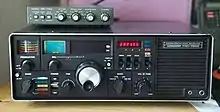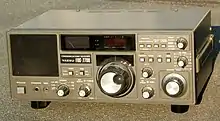Yaesu (brand)
Yaesu is a Japanese brand of commercial and amateur radio equipment.
 | |
| Type | Private |
|---|---|
| Founded | 1959 in Yaesu, Chūō, Tokyo, Japan |
| Website | www |

It was founded as Yaesu Musen Co., Ltd. (八重洲無線株式会社, Yaesu Musen Kabushiki-gaisha) in 1959 by a Japanese radio amateur Sako Hasegawa with call sign JA1MP[1] in the Tokyo neighborhood of Yaesu. The initial intent seemed to have been to develop and manufacture commercial and amateur radio transceivers for the Japanese market but by 1964 there were sales agreements placed in Australia and Germany.
In Europe, the equipment was sold under the Yaesu brand and the Sommerkamp brand. In 1963 the Swiss firm Sommerkamp imported Yaesu equipment and sold it using their own brand.
Yaesu's line of equipment was first imported into the US by Spectronics, Inc. located in Signal Hill, CA, in 1965. Yaesu became an important presence in the U.S. amateur radio market with the introduction and improvement of its very popular FT-101 line of equipment in the 1970s. In addition, transceivers were OEM'd to Henry Radio in Los Angeles. Spectronics was founded by William Turner, father of Robert Turner who went on to found EMG, Inc. manufacturer of EMG Pickups for electric guitars.
Sako Hasegawa (JA1MP) died in 1993 and Jun Hasegawa took over his job as managing director.
Yaesu Musen acquired the STANDARD radio equipment brand from Marantz Japan in 1998, and changed the company name to Vertex Standard Co., Ltd. (株式会社バーテックススタンダード, Kabushiki-gaisha Bātekkusu Sutandādo) in 2000. In 2007 Motorola announced its intention to purchase 80% of Vertex Standard and form a joint venture with Tokogiken (a privately held Japanese company controlled by Jun Hasegawa), which would hold the other 20%. This deal was completed in January 2008.[2] The joint venture was dissolved effective January 1, 2012. The Vertex Standard land mobile division operates as a wholly owned subsidiary headquartered in Tokyo, Japan.[3] The Amateur Radio, Airband and Marine Radio business was transferred to the new company "Yaesu Musen".[4]
Partial list of products
High-fidelity audio systems
- Yaesu YQ-41 (Quadraphonic stereo receiver) (1972)
- Yaesu YQ-41-IV (Quadraphonic stereo receiver) (1973)
- Yaesu YQ-60 (Quadraphonic stereo receiver) (circa 1975)
Receivers


- FR-50(B) (HF amateur band receiver)
- FR-101 (HF amateur band receiver)
- FRdx-400 (HF amateur band receiver)
- FRdx-500 (HF amateur band receiver)
- FRG-7 (HF communications receiver)
- FRG-100 (HF communications receiver)
- FRG-7000 (HF communications receiver)
- FRG-7700 (HF communications receiver) – An HF receiver for the radio amateur and for the commercial market. It is a metal-cased receiver with a polymer front and it is suitable for reception in the AM, FM, CW and SSB modes. Its frequency coverage is from 150 kHz – 30.0 MHz continuously in 30 switchable band segments. Its frequency readout is available in a traditional analog (dish) mode as well as in a digital display mode.[5] Called a “budget receiver”, the FRG-7700 was released in 1978 as successor to the FRG-7000 and priced at approximately US$450. This type was in production until 1982.[6] The FRG-7700 is a superheterodyne type receiver going up to 48 MHz in the Intermediate Frequency trap, followed by a fully synthesized local oscillators in the 1st and 2nd mixer unit and thus creating a VFO that is reasonably stable after warm-up.[7][8]
- FRG-8800 (HF communications receiver)
- FRG-9600 (VHF/UHF receiver/scanner)
- VR-120 (Hand-held wideband communications receiver)
- VR-500 (Hand-held wideband communications receiver)
- VR-5000 (Base wideband communications receiver)
Transceivers
Antenna Rotators
- G-1000DXA (Antenna rotator)
- G-2800DXA (Antenna rotator)
- G-450A (Antenna rotator)
- G-550 (Antenna rotator)
- G-5400 (Antenna rotator)
- G-5500 (Antenna rotator)
- G-5600 (Antenna rotator)
- G-600 (Antenna rotator)
- G-650 (Antenna rotator)
- G-800 (Antenna rotator)
- G-800DXA (Antenna rotator)
- G-800SA (Antenna rotator)
References
- http://home.alphalink.com.au/~gfs/yaesu/Yaesu1.htm
- "Motorola Completes Tender Offer for Yaesu's Parent Company". ARRL. 2007-11-05. Retrieved 2017-01-05.
- "Yaesu's Amateur Radio Division Breaks with Motorola, Changes Name to Yaesu Musen". ARRL. 2011-12-28. Retrieved 2017-01-05.
- 73 Magazine for Radio Amateurs. 73, Incorporated. 1981.
- Jerome S. Berg (October 2008). Listening on the short waves, 1945 to today. McFarland. pp. 299–. ISBN 978-0-7864-3996-6. Retrieved 9 December 2011.
- World Radio TV Handbook. Cardfont Publishers under license from Billboard Publications. 1986.
- Passport to World Band Radio. International Broadcasting Services. 1989.
External links
| Wikimedia Commons has media related to Yaesu Musen. |